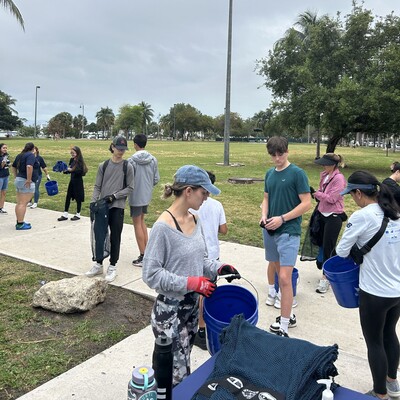SeaKeepers Monthly Margaret Pace Park Cleanup
Miami, Florida
February 18, 2024
Overview
On Sunday, February 18th, 2024, The International SeaKeepers Society hosted a cleanup at one of our monthly locations, Margaret Pace Park. We were joined by 31 determined volunteers on this gloomy morning, and after listening to instructions and a quick safety briefing, they set out to search the entirety of the park for trash. Using our reusable bags, buckets and gloves, volunteers picked up any debris they could find from the park’s grass and rocky shorelines. This park’s coast is along Biscayne Bay, meaning it is a direct pipeline for litter to become marine debris, thus threatening the local wildlife and contaminating our beautiful bay. Some volunteers returned with bags stuffed with larger items made of plastic, glass and aluminum, while others brought back buckets full of small pieces of debris they had pulled out from between rocks on the coast. All of these efforts are significant, as the rainstorm that brought our cleanup to a premature end would also likely have carried all of this debris directly in the bay had our volunteers not picked it up. Although we had to wrap up early due to the weather, our volunteers still managed to remove over 40 lbs of trash from the park, and we are so grateful for their efforts. We hope to see them again at a future (drier) cleanup!
Outing Goal
Marine Debris Tracker is a data collection app that allows the general public to contribute to an open-date platform and scientific research by recording the different types of litter, specifically plastic pollution, that they find in either inland or marine environments. Marine Debris Tracker was developed by the University of Georgia’s Jambeck Research Group, which SeaKeepers worked with in 2021 when the Jambeck Research Group collaborated with Ocean Conservancy to assess Miami’s plastic waste management, known as a Circularity Assessment Protocol. SeaKeepers again assisted the Jambeck Research Group’s Circularity Informatics Lab in 2022 with another Circularity Assessment Protocol in the Florida Keys. The researchers of the Jambeck Lab use the Marine Debris Tracker app to record their data, and with citizen scientists also using the app, more data can be collected in different areas. Using Marine Debris Tracker at our cleanups involves community members in creating a bigger picture of plastic pollution, and provides the means for new scientific findings to be generated as well as for effective local legislation to be informed. SeaKeepers is excited to be incorporating this app at our cleanups and continue our mission of coastal education, protection, and restoration. In this cleanup, 70% of volunteers participated in using the app to record data.


You must be logged in to post a comment.